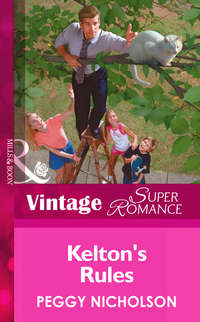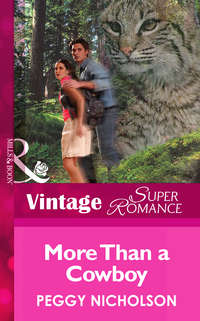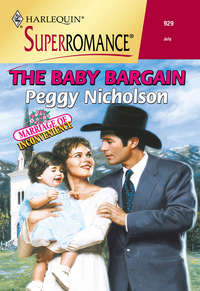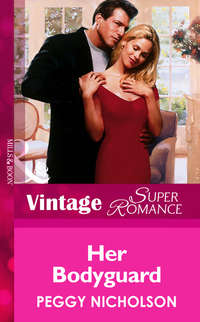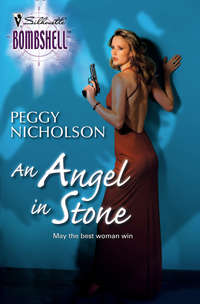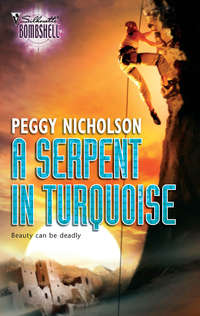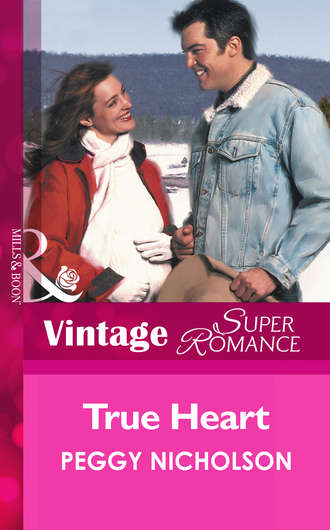
Полная версия
True Heart
“Just what the town needs,” Kaley said approvingly. “A serious restaurant. When I lived here, a hot date was steakburgers for two at Mo’s Truckstop out on the highway.”
“Still is, for the older crowd,” Michelle admitted. “And most of the truckers and cowboys. But some of the younger set are giving me a chance. Then there are the yuppie commuters moving up from Durango, plus the dudes and the tourists.”
Whenever Kaley and Jim spoke on the phone, Jim complained about the way southwestern Colorado was changing. Five-acre ranchettes replacing working cattle ranches. Outsiders moving in with money that the locals couldn’t hope to match. Values they didn’t want to match. Ideas of ways to “improve” a country that the natives liked just the way it was and always had been.
So far the cattlemen north of Trueheart were holding their own, with most of the changes confined to the town, Jim had reported. Suntop Ranch, the largest outfit in this part of the state, seemed to exert some sort of gravitational pull, holding the smaller ranches like Kaley and Jim’s Circle C safe in its orbit. So far.
Still, as the land folded itself into deeper and greener valleys, steeper ridges that lifted toward massive peaks, looming dark against a rosy sky, Kaley looked fearfully for signs of change. She ticked off each familiar landmark as she came to it with a sigh of relief. On her left the sign to the Ribbon River Dude Ranch—guests still Welcome. Then to her right, the turnoff to the private airport with its bluff overlooking the distant town, where courting couples parked on summer nights to “watch the planes take off.” Then they were coasting down the foothills into Trueheart, past Mo’s Truckstop, past the tiny Congregationalist church with its modest white steeple, where, once upon a time, so long ago it almost seemed like a fairy tale, Kaley had planned to be married.
And if Tripp McGraw had really wanted to marry me? She touched her stomach and tipped up her chin. Well, he hadn’t. And if he had, she wouldn’t be carrying this precious passenger. Much as they’d hurt at the time, things worked out for the best. Would do so again, she told herself firmly.
Michelle glanced at her watch as they turned onto Main Street. “Speaking of breakfast, I hope you’ll let me feed you a magnificent one. Eggs Benedict maybe? Or buckwheat pancakes with native berries?”
“Some other time I would love that,” Kaley assured her. “But I want to catch Jim before he rides out for the day, so…”
Michelle made a ticking sound with her tongue. “He doesn’t know you’re coming?”
“No.” Kaley had hoped till the last day—till the very last hour—that she and Richard could work things out. She’d have felt disloyal airing their differences—temporary differences, she’d been so sure—before her younger brother. Especially since Jim had never, in all these years, quite warmed to his brother-in-law. Why give him further reasons to disapprove, when what she wanted was a larger, happier family, not a family divided?
“No, I didn’t tell him, but it doesn’t matter.” There’d always be a place for her and hers at the ranch. A wave of weary gratitude washed over her as she braked the car before Michelle’s Place. She was luckier than so many single mothers. Because no matter how desperately lonely she’d been this past month, she wasn’t alone. She could count on her brother, count on her welcome, count on her bedroom being there, bed made and pillows fluffed, her favorite childhood books lined up on her shelves, her great-grandmother’s old pine wardrobe standing ready for her clothes. Whether she deserved it or not, she had a place in the world, reserved in her name. While such a sanctuary waited, she’d count herself among the lucky.
“Well, if it turns out you miss him,” said Michelle, opening her door before the car had stopped, “don’t hesitate to come back into town and let me feed you.”
“Thanks.” Though if she missed Jim, it was bread, butter and milk, then she’d crawl upstairs for a hot shower and a round-the-clock collapse.
Michelle gathered up her purse and overnight bag, swung her long legs out of the car, slammed the door and leaned back in the open window. “Thanks again, Kaley.” She glanced aside as a red pickup tooted its horn and turned into her parking lot. “And here comes Sam Kerner, riding point. I’m going to get no end of grief that there’s no coffee waiting.”
The local vet, a big-animal specialist. Likely as not, Sam was stopping in to Michelle’s on his way home from tending a sick cow. Kaley smiled wearily. Her landmarks were all holding true.
“And Sheriff Naley,” Michelle added as a gray pickup followed the red into her lot. “Kaley, if you ever want to just…talk. About anything at all? Breakups are tough—I should know. Anyway…” She shrugged and smiled her wide, rueful smile. “I live upstairs here and the coffeepot’s always on. Stop by any ol’ time.” She glanced back the way they’d come. “Oh, now, here comes a customer to die for. Do you know Tripp McGraw?”
“Vaguely. Well, guess I should let you get cooking.” Kaley revved the engine, lifted a hand in farewell as Michelle hastily straightened. “See you!” She had barely time to swing out from the curb before Tripp’s oncoming truck. It loomed up in her rearview mirror, its driver a dim, wide-shouldered shape beyond the glass. He was towing a horse trailer behind, she noted, as she accelerated and he slowed for his turn. But no—oh, no—he’d only slowed to wave to Michelle and now he was driving on.
He followed her for a block or two, and Kaley drove with hunched shoulders, hands clenching her wheel, though she was being silly. There was no way Tripp could know this car was hers. She’d been dodging him successfully for years.
Still, she averted her face as she made her turn north toward the mountains, and she let out a pent breath when he drove toward the east. “Whew!” she whispered, and drew in a shaky breath. Downhearted and tired as she was this morning, he would have been one local landmark too many.
CHAPTER TWO
KALEY DROVE the last ten miles to the ranch in a haze of exhaustion. The early sun shining in her eyes made her squint, and once her lashes drooped, conscious thought dissolved into drifting images, the present blurring with vivid memories of the past. A fine herd of Black Angus crosses on Suntop land—the Tankerslys always had the best. Five pronghorn antelope on a hill overlooking the highway. Buzzards riding an early morning thermal to the south—something dead over there, maybe? No snow on the peaks yet in August, but soon, soon. She hadn’t skied in years, used to love to, but maybe this year… With a baby coming on, Kaley? For a moment she’d actually forgotten!
On her left now was the road to the McGraw ranch. The McGraw brand was burned into the arching plank signboard: M Bar G. Brands… His should have been a comet, a shooting star…that way he used to touch his scarred cheek when he encountered someone unexpectedly, or when he was sad or uncertain… She’d caught his hand more than once, drawn it down to her lips and kissed it…
Her left front wheel dropped into a pothole in the road— Kaley yelped her surprise and took a firmer grip on the wheel.
Sunlight gave way to shadow as the road passed onto National Forest land. Aspens shivered in no breeze at all along the flashing creek, their leaves here and there already gleaming golden—getting late. Too late. Jim will have ridden out by now. But maybe Whitey would still be puttering around the kitchen. He’d have some harsh things to say about Richard; he’d never approved of her marrying a lawyer. Harsh things to say to her, too. Kaley smiled. Coming home.
“And here we are,” she informed her tiny passenger as a line of barbed wire slanted down the hill to define the border of Cotter land. She frowned—a post leaning badly there, hadn’t Jim noticed? At least now he’ll have some help. She ought to be able to ride and work till Christmas, anyway, as long as she was careful. She certainly meant to pull her weight—her lips curved in a rueful grin. Guess that’ll just get harder and harder, for a while. Still, though she was claiming sanctuary, she had no intention of being a burden.
At last she came to the private road to the ranch. The house wasn’t visible yet, but after her car topped the second low rise, she looked down into the valley and let out an audible sigh. Home at last!
IT WAS EIGHT BY THE CLOCK in her car when Kaley stepped out, stretched her aching limbs and trudged to the kitchen door. Suddenly she was just as glad Jim would likely not be home. She was too tired to explain anything. Tonight, after she’d slept, would be soon enough.
She entered via the back door and walked through the mudroom, then stopped in the kitchen doorway. “Jim!” Dressed, not in his usual Wranglers and boots, but in a pair of town-going trousers and, wonder of wonders, an ironed shirt. His hair not as shaggy as usual, but clipped close to his head.
“Kaley! You got my—” Her brother paused, frowning, to set the mug of coffee he’d been drinking on the counter. “You can’t have gotten it yet.”
“Gotten what?” She stood blinking stupidly, still waiting for the whoop and a hug that should be coming.
Jim made no move to close the gap between them. “My letter. But there’s no way, when I only mailed it yest—” The scowl on his tanned face deepened. “Whitey called you! Why, that old mule-headed, son of a—”
“Nobody called me. What’s going on?” She nodded at his clothes. “Somebody died?” A funeral. That could be the only explanation for such attire on a workday.
“No.” At last he moved toward her, to brush the skin under her lashes with one work-hardened fingertip. “You look done in, sis. Come sit down. Want a cup of coffee?” He guided her toward the kitchen table, swung a chair out for her.
She stared at the battered canvas duffel bag that rested on the floor beside it. Their father’s air force bag. It had survived Vietnam along with him, then come home to be bequeathed, years later, to his son.
The bag looked stuffed full. Her eyes skated along the scarred linoleum from the bag to Jim’s unbooted feet. “Jim, what’s— You sent me a letter about…what?”
“Here. Sit.” He pressed her into the chair, moved his bag out to the mudroom—as if she’d forget about it!—then busied himself, avoiding her searching gaze, fixing her a mug of coffee from the pot on the stove. “Guess you missed it. My letter’s probably hitting your mailbox today. But what are you doing here?”
Apparently she’d have to talk first. She let out a long-suffering sigh and propped her face in her hands. “That’s not my mailbox anymore, Jim. Not my address. I’ve left Richard. Divorced him yesterday in Vegas.”
The mug Jim had been offering her dropped from his fingers—smashed on the floor, hot coffee spattering their feet and ankles. He stood gaping, then closed his eyes, shook his head and said softly, fervently, “Crap… Crap, crap, tell me you’re joking!”
“No joke.” She could understand surprise—she was still in shock herself—but horror? “You never liked him anyway, so— Jim, what’s wrong?”
He crunched through the bits of pottery to yank out the chair opposite hers and collapse into it. “Crap.” He broke into bitter laughter, then stopped abruptly. “Who says Cotters never have any luck? It’s just that it’s all the wrong kind of—”
She smacked the table flat-handed. “Tell…me…what…was in that letter?” He lost that black smile; his dark eyebrows flew together, and she added hastily, “Please? What did you want to tell me?”
His eyes stopped flashing and dropped to the table. He reached for the sugar bowl, lifted the lid and clinked it aimlessly back into place. “Monday after next, Kaley, what date is that?”
“Hey, I’ve driven all night. I’m too tired for guessing games.”
“It’s my birthday. My twenty-eighth.”
She studied his face, the same dark-lashed, navy-blue eyes as her own, meeting hers half in pain, half in angry challenge. What was she missing here? “Yes. I’d forgotten.”
“I’ll be twenty-eight, Kaley.” He scowled when she still didn’t get it. “You can’t join the air force any older than that.”
“Oh…Jim!” He hadn’t mentioned that ambition in years, not since she went away to college. She’d assumed it was simply a teenager’s dream, long left behind. He’d grown up on their father’s tales of his flying adventures in the war. Hadn’t Jim noticed, as she had, how carefully those tales had been edited? Their father had told them of the good times—the wonderful friendships forged in wartime, the sun on snowy clouds like castles in the air, the feel of a jet answering as sweetly to the yoke as the best cutting horse to the rein, the thrill of night landings on an aircraft carrier in the open sea.
But Kaley had seen her father’s face when Jim had asked him what it was like to loose a clip of bombs on a peasant village—the instant change of subject and mood. Hadn’t Jim once stopped to think that their father had left that all behind as quick as he could? He hadn’t stayed in the service; he’d done his duty, then come straight home to Colorado, back to what mattered. “I didn’t realize,” she said carefully as Jim continued to glare his defiance. “I thought—”
“That I’d grown out of all that? Changed my mind, decided I’d rather punch cows the rest of my life than pilot a jet? You’ve always believed what you want to believe. Dad needed somebody and it wasn’t going to be you—you’d already run off to college and married your city slicker. So who did that leave holding the bag?”
“But Dad couldn’t do it alone.” The illness that had finally claimed him had sapped his strength for years before the end. “There was no way he could have kept the ranch going without your help.”
“I know that.” Jim rubbed a big hand tiredly up his face. “And I didn’t begrudge it while he was here. But he’s gone now, so what about my dreams?”
What could she say to that? “If I’d known you had any—” She stopped at his harsh laughter. “I mean any apart from ranching. But you didn’t tell me, Jim. I thought you loved it here.”
“You thought I felt the way you do,” he said flatly. “Just because I didn’t whine didn’t mean I was happy.”
She let out a slow breath. Another thing she hadn’t seen, just as she’d missed Richard’s true feelings about children. Was she that selfish and blind?
“I tried to make a go of it,” Jim continued, lifting the lid to the sugar bowl once more and dropping it, raising it and clinking it down again. “Tried hard since Dad was gone. I don’t want to lose this place any more than you do. But I don’t want to be chained to it, Kaley. Looking up when the jets fly over from Colorado Springs, wishing I was up there, not stuck down here with a jar full of pink-eye ointment and an irrigation ditch to muck out.”
She put her knuckles to her mouth and bit down, thinking hard. “Will it help any now that I’m back? That should free up some of your time. Maybe we could go halves on the chores…” At least, once her baby was delivered they could, if Jim would be patient that long. “If you took private flying lessons, maybe rented a plane?” But that could hardly be cheap and money had been tight around the ranch for years; they were just barely holding their own with her teaching salary added to the ranch’s profit… And now that she’d no longer be teaching… I’ll have to think. There had to be some way.
Jim shook his head. “I wish you’d gotten that letter. This was easier to say long distance.” He sucked in a deep breath and let it out on four simple words.
“I’ve already joined up.”
WHAT NOW, WHAT NOW, what now? Kaley wondered, scrubbing a hot washrag over her face. She’d had to excuse herself and go upstairs, as much to gain time to think as to freshen herself. What am I going to do now? If she’d had a day to think things out—even half a day—but in reality she had less than an hour. Jim was due at the induction center by noon.
He’d signed the papers and for the next four years, he belonged to the air force; she might as well ask them for one of their jets as for her brother back. He was as good as gone.
And he’d said they had more things to talk about. I’ll say! Kaley glanced down at her stomach, then grimaced. No, that wasn’t fair, to mention her baby now, when there was nothing he could do to help her. It would only make him feel guiltier when he felt bad enough already. Braced on the cool porcelain, she leaned over the sink, staring down into the darkness of the open drain, like the hole Alice fell down to Wonderland. She’d dropped into a whole new country. Not the safe and comforting one she’d been fleeing to, had counted on for the past miserable month.
It isn’t fair!
No. She sucked in a breath and held it. She was the one who hadn’t been fair, telling herself that Jim was satisfied with his life. Time to grow up, Kaley. Mothers really ought to be grown-ups. She touched her stomach for luck, squared her shoulders and went back downstairs.
Jim was sitting out on the back stoop, staring off toward the high country. She sat down beside him, their shoulders brushing, glanced at him and had to smile, he looked so miserable. “It’s not that bad, flyboy. I’ll manage.” Somehow. “Me and Whitey. You’ve done it for years. Now it’s my turn.”
His Adam’s apple bobbed painfully and he shook his head. “I haven’t told you the half of it yet. Wish I’d kept a copy of that damn letter to show you now.”
What could be worse than his leaving? “What else?” she said lightly.
“You remember after Dad died, when I told you we’d have to have more cash to keep going? That the books were in much worse shape than he’d let on. When I asked you for more money and you couldn’t let me have it?”
She nodded. “I’d just paid for my first semester on my master’s degree.” And she and Richard had just moved into a bigger, fancier house out in Scottsdale. Richard had set his heart on it, had said it projected the right kind of image for his new position in the firm, and they’d already put the money down when her father died.
She winced, remembering. “I felt awful about that. But you got a loan anyway, in the end, a third mortgage from the bank.”
Jim put his head down on his forearms, which were resting on his knees. “Not from the bank, Kaley. That’s not where I ended up getting the money.”
“But you said—”
“I lied, all right? The bank wouldn’t risk a third mortgage, what with the loans they hold on us already.”
She felt her heart stutter. “Where did you get it, then?” Jim had wanted a chunk—forty thousand.
“Borrowed it from Tripp McGraw.”
“Tripp.” Her hands felt cold—icy—and the day darkened. Someone was feeling very sick to her stomach. Kaley dropped her head between her knees and gulped air.
“Kaley?” Jim thumped her back. “Hey!”
“How could you?” Anyone in the whole wide world but Tripp McGraw! “How could you?”
“I could, ’cause he would, and we had to have that money to keep going. And that—this—is why I didn’t tell you. You didn’t want to know.”
“No, I didn’t. Don’t.” She’d closed the door on Tripp McGraw nine years ago, when he’d broken their engagement, and she’d never looked back. Hadn’t dared. The only way to happiness had been to pretend Tripp didn’t exist. Never had. “We have to pay him back immediately!”
“That’s what I suggested in my letter. We’ll have to sell. To him, if we don’t find a higher bidder. He’ll deduct his loan from the purchase price and—”
“Are you out of your mind?” Kaley pushed herself upright to stare at him. “Sell the ranch?” Four generations had struggled to hold this land, and now Jim was going to trade it for an airborne toy? A shiny toy that was only his on loan from the government?
“Yes, sell it, why the hell not?” Jim stalked off the steps and wheeled back again, eyes blazing. “You don’t want it—you’re an English teacher, not a cowgirl now! I’m supposed to hang on to your dreams for you if you won’t do it yourself? You call that fair?”
Slowly, Kaley shook her head. “No…” She put one hand to her stomach, the other to her cheek and found it wet—knuckled the tears away and tried to smile.
“So what exactly do we owe Tripp, and when is it due?”
CHAPTER THREE
WATCHING LONER WALK INTO the buyer’s trailer had been harder than Tripp would have thought possible.
“Loads well,” Huckins noted with satisfaction as the stallion followed his man up the ramp, ears pricked, dark intelligent eyes taking in the new conveyance with his usual bold curiosity.
“Yep.” All my horses load well. That the Californian should be surprised wasn’t the best of signs. A horse that feared the ramp—well, that said more about the animal’s handler than it did about the horse. Should have insisted he ride him before I agreed to sell. Watching Huckins in the saddle, Tripp would have known for sure if he deserved the stallion. If he had the patience, and the know-how, and the appreciation that he ought.
For Pete’s sake, McGraw, that’s just a damn horse! Not your virgin daughter.
Smartest, fastest, finest cutting horse he’d ever owned. With more cow sense than a twenty-year-old bull. Tripp had bred him himself, begun gentling him within an hour of his foaling. Loner and he had had the best kind of understanding.
The back gate of the trailer was swung shut with a careless bang. Tripp winced inwardly and set his back teeth. I owed him that much, to watch Huckins ride.
Too late now. He brushed his thumb across his shirt pocket, and the folded check rustled softly. Cold comfort at this moment. He’d never dreamed this would hurt so much. Never dreamed he’d need to do it.
Huckins had first phoned him months ago after Loner had ranked a close second for the National Cutting Horse Association World Champion of the year. The Californian had offered a truly astonishing sum should Tripp ever care to sell.
Back then, selling Loner had been unimaginable. Downright laughable. The chunky buckskin was going to be Tripp’s foundation sire for a line of cutting horses the likes of which had never been seen before. McGraw horses that would spin on a dime and give you eleven cents change. A line of cutters that would bring the ranch a second source of income, to offset the sickening swoops in the cattle market.
Instead, here he was, cashing Loner in like a forgotten check he’d found in the back of his wallet. Because there was one thing in the world Tripp needed more than the country’s finest cutting horse, and that was land.
Tripp swallowed and found his throat aching. “Well…” He held out his hand. “You’ve got a long drive ahead of you.”
“Don’t worry about him, McGraw. I’ll treat him well. Like the prince he is.”
You do or you’ll find me on your doorstep! “Sure.” Tripp turned on his boot heel and walked. Land, he reminded himself, trying to drown out the sound of Huckins’s pickup starting up behind him. Land—that magical, crucial word. No, make it two words. Enough land.
Maybe he’d stop by Cotter’s, before he went home, cheer himself up. Plant his feet on the land Loner had bought him.
JIM WEDGED his duffel bag onto the floorboard of his truck and closed the door. Walked around to the driver’s side, and stood, fingering the handle. “I hate to leave you like this. It isn’t right.”
“Can’t see you’ve got much choice.” And by now Kaley was swaying with fatigue and shock. She just wanted him gone so she could crawl up to bed. Sleep first, figure it out later, she told herself. “Stop worrying. I’ll be all right.” Somehow. She shuffled forward and hugged him fiercely. “Now, go knock ’em dead, flyboy. Make me and Dad and Whitey proud.”
She waved till his pickup had topped the first rise, then her shoulders slumped and her smile flattened to a trembling line.
Closing her eyes, she stood, hearing the quiet creep in around her. Each time she returned, she marveled how quiet it was out here. It had never mattered when, come suppertime, there’d be family at the table. One hand crept to her stomach, then she turned and went inside.
AFTER SHE’D USED UP all the hot water showering, Kaley wrapped herself in a white terry-cloth bathrobe, the one she’d taken from her mother’s closet after her death. It had been Kaley’s for years now, since she was fourteen. Had accompanied her to college, then out to Arizona. But Richard had never liked it, so on one of her visits she’d left it here, where it belonged. One more raggedy, comforting landmark waiting for her return.


